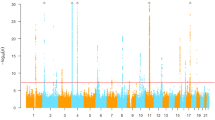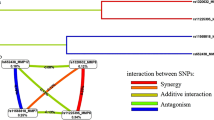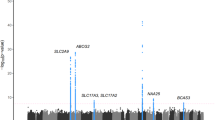Abstract
The past two decades have seen an upsurge in detecting the genetic determinants of hypertension. Thereafter, α-adducin gene ranks high and one polymorphism, G460W (rs4961), has attracted special attention. We first performed a case–control study to investigate the association of this polymorphism with essential hypertension among Shanghai residents, and then meta-analyzed all available evidence. A total of 950 subjects were recruited for genetic association study. Genotyping for G460W was conducted using PCR and restriction fragment length polymorphism techniques. Meta-analysis search was limited to articles published in English and studies on humans. Data and study quality were assessed in duplicate. Publication bias was evaluated using the fail-safe number. Our case–control study provided no evidence for the association of G460W with essential hypertension, even under assumptions of three genetic modes of inheritance (P>0.05). The subsequent meta-analysis including 15 studies with 4417 cases and 5716 controls also failed to demonstrate overall this association, even upon stratification by race (Caucasians and Asians). For example, the summary odds ratio (OR) under a random effects model indicated that carriers of 460W allele were 1.09 times more likely to develop hypertension (95% confidence interval (CI), 0.96–1.24; P=0.19) among Asians, whereas a protective effect of this allele was observed in Caucasians (OR, 0.93; 95% CI, 0.73–1.18; P=0.54). The fail-safe number at the level of 0.05 was in favour of our findings. Our case–control study and the following meta-analysis failed to provide evidence for the genetic association of α-adducin gene G460W polymorphism with hypertension.
This is a preview of subscription content, access via your institution
Access options
Subscribe to this journal
Receive 12 digital issues and online access to articles
$119.00 per year
only $9.92 per issue
Buy this article
- Purchase on Springer Link
- Instant access to full article PDF
Prices may be subject to local taxes which are calculated during checkout

Similar content being viewed by others
References
Lalouel JM, Rohrwasser A . Development of genetic hypotheses in essential hypertension. J Hum Genet 2001; 46: 299–306.
Jeunemaitre X . Genetics of the human renin angiotensin system. J Mol Med 2008; 86: 637–641.
Cusi D, Barlassina C, Azzani T, Casari G, Citterio L, Devoto M et al. Linkage but lack of association for blood pressure and the alpha-adducin locus in normotensive twins. Lancet 1997; 349: 1353–1357.
Tripodi G, Valtorta F, Torielli L, Chieregatti E, Salardi S, Trusolino L et al. Hypertension-associated point mutations in the adducin alpha and beta subunits affect actin cytoskeleton and ion transport. J Clin Invest 1996; 97: 2815–2822.
Bianchi G, Tripodi G, Casari G, Salardi S, Barber BR, Garcia R et al. Two point mutations within the adducin genes are involved in blood pressure variation. Proc Natl Acad Sci USA 1994; 91: 3999–4003.
Ju Z, Zhang H, Sun K, Song Y, Lu H, Hui R et al. Alpha-adducin gene polymorphism is associated with essential hypertension in Chinese: a case–control and family-based study. J Hypertens 2003; 21: 1861–1868.
Wang JG, Staessen JA, Barlassina C, Fagard R, Kuznetsova T, Struijker-Boudier HA et al. Association between hypertension and variation in the alpha- and beta-adducin genes in a white population. Kidney Int 2002; 62: 2152–2159.
He X, Zhu DL, Chu SL, Jin L, Xiong MM, Wang GL et al. alpha-Adducin gene and essential hypertension in China. Clin Exp Hypertens 2001; 23: 579–589.
Perloff D, Grim C, Flack J, Frohlich ED, Hill M, McDonald M et al. Human blood pressure determination by sphygmomanometry. Circulation 1993; 88: 2460–2470.
Ishikawa K, Katsuya T, Sato N, Nakata Y, Takami S, Takiuchi S et al. No association between alpha-adducin 460 polymorphism and essential hypertension in a Japanese population. Am J Hypertens 1998; 11: 502–506.
Lau J, Ioannidis JP, Schmid CH . Quantitative synthesis in systematic reviews. Ann Intern Med 1997; 127: 820–826.
Higgins JP, Thompson SG, Deeks JJ, Altman DG . Measuring inconsistency in meta-analyses. BMJ 2003; 327: 557–560.
Iwai N, Tamaki S, Nakamura Y, Kinoshita M . Polymorphism of alpha-adducin and hypertension. Lancet 1997; 350: 369.
Kato N, Sugiyama T, Nabika T, Morita H, Kurihara H, Yazaki Y et al. Lack of association between the alpha-adducin locus and essential hypertension in the Japanese population. Hypertension 1998; 31: 730–733.
Melander O, Bengtsson K, Orho-Melander M, Lindblad U, Forsblom C, Råstam L et al. Role of the Gly460Trp polymorphism of the alpha-adducin gene in primary hypertension in Scandinavians. J Hum Hypertens 2000; 14: 43–46.
Alam S, Liyou N, Davis D, Tresillian M, Johnson AG . The 460Trp polymorphism of the human alpha-adducin gene is not associated with isolated systolic hypertension in elderly Australian Caucasians. J Hum Hypertens 2000; 14: 199–203.
Barlassina C, Norton GR, Samani NJ, Woodwiss AJ, Candy GC, Radevski I et al. alpha-Adducin polymorphism in hypertensives of South African ancestry. Am J Hypertens 2000; 13: 719–723.
Clark CJ, Davies E, Anderson NH, Farmer R, Friel EC, Fraser R et al. alpha-Adducin and angiotensin I-converting enzyme polymorphisms in essential hypertension. Hypertension 2000; 36: 990–994.
Province MA, Arnett DK, Hunt SC, Leiendecker-Foster C, Eckfeldt JH, Oberman A et al. Association between the alpha-adducin gene and hypertension in the HyperGEN Study. Am J Hypertens 2000; 13: 710–718.
Shioji K, Kokubo Y, Mannami T, Inamoto N, Morisaki H, Mino Y et al. Association between hypertension and the alpha-adducin, beta1-adrenoreceptor, and G-protein beta3 subunit genes in the Japanese population; the Suita study. Hypertens Res 2004; 27: 31–37.
Mead PA, Harvey JN, Rutherford PA, Leitch H, Thomas TH . Sodium–lithium countertransport and the Gly460 → Trp alpha-adducin polymorphism in essential hypertension. Clin Sci (London) 2005; 108: 231–236.
Ramachandran V, Ismail P, Stanslas J, Shamsudin N . Analysis of renin–angiotensin aldosterone system gene polymorphisms in Malaysian essential hypertensive and type 2 diabetic subjects. Cardiovasc Diabetol 2009; 8: 11.
Sugimoto K, Hozawa A, Katsuya T, Matsubara M, Ohkubo T, Tsuji I et al. alpha-Adducin Gly460Trp polymorphism is associated with low renin hypertension in younger subjects in the Ohasama study. J Hypertens 2002; 20: 1779–1784.
Staessen JA, Wang JG, Brand E, Barlassina C, Birkenhäger WH, Herrmann SM et al. Effects of three candidate genes on prevalence and incidence of hypertension in a Caucasian population. J Hypertens 2001; 19: 1349–1358.
Shi G, Gu CC, Kraja AT, Arnett DK, Myers RH, Pankow JS et al. Genetic effect on blood pressure is modulated by age: the Hypertension Genetic Epidemiology Network Study. Hypertension 2009; 53: 35–41.
Greene CS, Penrod NM, Williams SM, Moore JH . Failure to replicate a genetic association may provide important clues about genetic architecture. PLoS One 2009; 4: e5639.
Moore JH, Williams SM . New strategies for identifying gene-gene interactions in hypertension. Ann Med 2002; 34: 88–95.
Moore JH . The ubiquitous nature of epistasis in determining susceptibility to common human diseases. Hum Hered 2003; 56: 73–82.
Acknowledgements
We acknowledge the assistance and cooperation of the faculty and staff of the Department of Hypertension at Ruijin Hospital. We thank the dedicators for their enthusiastic participation. This work was financially supported by the Shanghai ‘Chen Guang’ Project (09CG12); the Natural Science Foundation of Shanghai (09ZR1426200); two Excellent Young Teachers Programs, one from Ruijin Hospital (WN) and the other from Shanghai City (WN); the Science Fund of Shanghai Jiaotong University School of Medicine (09XJ21019) and the National Science Foundation for Young Scientists of China (Grant number 30900808).
Author information
Authors and Affiliations
Corresponding author
Ethics declarations
Competing interests
The authors declare no conflict of interest.
Rights and permissions
About this article
Cite this article
Niu, WQ., Zhang, Y., Ji, KD. et al. Lack of association between α-adducin G460W polymorphism and hypertension: evidence from a case–control study and a meta-analysis. J Hum Hypertens 24, 467–474 (2010). https://doi.org/10.1038/jhh.2009.88
Received:
Revised:
Accepted:
Published:
Issue Date:
DOI: https://doi.org/10.1038/jhh.2009.88
Keywords
This article is cited by
-
Habitual dietary intake of β-carotene, vitamin C, folate, or vitamin E may interact with single nucleotide polymorphisms on brachial–ankle pulse wave velocity in healthy adults
European Journal of Nutrition (2016)
-
Reevaluation of the association of seven candidate genes with blood pressure and hypertension: a replication study and meta-analysis with a larger sample size
Hypertension Research (2012)
-
α-adducin Gly460Trp polymorphism and essential hypertension risk in Chinese: a meta-analysis
Hypertension Research (2011)
-
Contribution of five top whole-genome association signals to hypertension in Han Chinese
Journal of Human Hypertension (2011)



